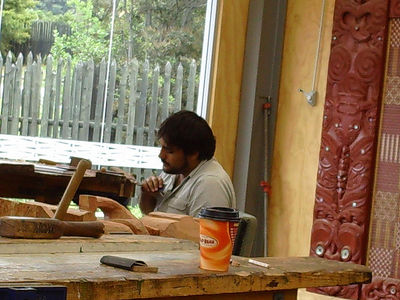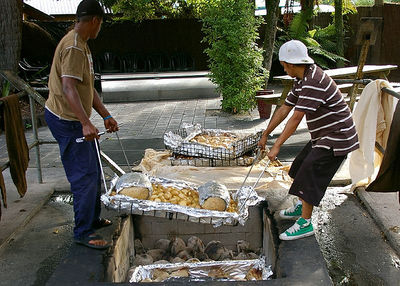Implications for your teaching practice
| Practice Context | |
|---|---|
| Cultural Competence | |
| Applying Te Reo and Tikaka in practice | Objectives | What do you know about Māori language and culture? | Implications for your teaching practice | e-Learning activity - Exploring Te Reo and Tikaka. | Learning Summary |
The previous modules have introduced you to some of the expectations of the Tertiary Education Strategy,[1] and the resource Tataiako: Cultural Competencies for Teachers of Māori Learners.[2] You have also explored the principles of the Treaty of Waitangi.
With these in mind it is useful to reflect on how you incorporate your current knowledge of Te Reo Māori and tikaka to make a difference to the relationships you as an educator establish with learners.
- Do you use Māori greetings or acknowledgements?
- Do you acknowledge tikaka such as separate spaces for food and work?
- Do you acknowledge appropriateness or not of sitting on tables?
- Do you encourage whanau to be included in learning?
| The following video clip shows a strong immersion and incorporation of Te reo in a primary school class but listen carefully to the examples of tikaka/tikanga that are integrated into the usual activities of the class.
Tikanga Māori in the classroom [3] How do you include tikaka in your teaching? |
Does your own level of knowledge of Te Reo and tikaka make a difference to how you would be able to answer the following questions, especially relating to Māori students?
What is the rationale for your response? Challenge: It is OK to feel as though there are gaps in your knowledge or that you want to learn more about Te Reo and tikaka. Your journey as an educator is part of a lifelong learning continuum. With the aim of providing the best possible learning environments for all learners what can you do to assist in this? |
Useful starting resources
Seek courses within your own tertiary institution for local knowledge.
100 Māori words every New Zealander should know[4]
Te Kete Tikanga Māori - Māori Cultural Kit[6]
Website of Te Rūnanga o Ngāi Tahu[8]
For those who would like further reading
Huakina mai: Doorways toward culturally responsive education is a research paper looking at a tertiary summer school course and exploring how 4 principles could be used to sustain a learning environment that values diversity. It includes questions designed “to stimulate reflective analysis of teaching practices, attitudes, and critical awareness of how actions and intentions may be perceived by others”. [9]
References
- ↑ Ministry of Education. (2014). Tertiary Education Strategy 2014 - 19. Wellington, New Zealand: New Zealand Government. Retrieved from http://www.minedu.govt.nz/NZEducation/EducationPolicies/TertiaryEducation/PolicyAndStrategy/TertiaryEducationStrategy2014-2019.aspx
- ↑ Ministry of Education., & New Zealand Teachers Council. (2011).Tataiako: Cultural Competencies for Teachers of Māori Learners. Wellington, New Zealand: New Zealand Government. Retrieved from http://www.teacherscouncil.govt.nz/required/Tataiako.pdf
- ↑ Te Kete Ipurangi. (n.d.).Tikanga Māori in the classroom. Retrieved from http://hereoora.tki.org.nz/Videos/How-to-plan-for-te-reo-Maori/Tikanga-Maori-in-the-classroom
- ↑ Ministry for Culture and Heritage. (2013). 100 Māori words every New Zealander should know. Retrieved from http://www.nzhistory.net.nz/culture/maori-language-week/100-maori-words
- ↑ Māori Language Commission. (n.d). Kōrero Māori. Retrieved from http://www.korero.maori.nz/
- ↑ New Zealand Trade and Enterprise. (n.d.)Te Kete Tikanga Māori - Māori Cultural Kit. Retrieved from http://www.nzte.govt.nz/en/how-nzte-can-help/te-kete-tikanga-maori-cultural-kit/
- ↑ Kokiri Hauora. (2010). Tikanga Maori Values. Retrieved from http://www.r2r.org.nz/maori-health/tikanga-maori-values.html
- ↑ Te Rūnanga o Ngāi Tahu. (1996). Te Rūnanga o Ngāi Tahu. Retrieved from http://www.ngaitahu.iwi.nz/
- ↑ Macfarlane, A. (2010). ‘’Huakina mai: Doorways toward culturally responsive education’’ New Zealand: Good Practice Publication Grant scheme. Ako Aotearoa. Retrieved from http://akoaotearoa.ac.nz/ako-hub/good-practice-publication-grants-e-book/resources/pages/huakina-mai-macfarlane#Cultural_resp

